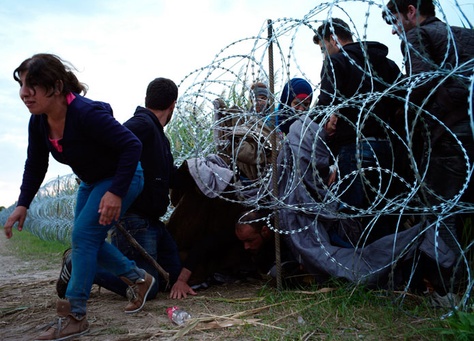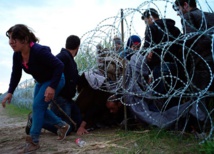"We've got eight cars and around 30 volunteers," he told AFP as students and activists stuffed garbage bags full of warm clothes, shoes and blankets into vehicles.
Soon they will set off on the 2,000-kilometre (1,200-mile) journey south to Croatia, Macedonia and Serbia.
"The response of ordinary people was incredible," Bulanda said as he loaded a shiny new luxury-brand van that a car rental company loaned them free of charge.
"Everything we're doing is also a way to voice our protest against the inaction of the countries in our region regarding the humanitarian crisis in the Balkans."
More than 750,000 people have crossed the Mediterranean this year, many fleeing war in Syria, Iraq and Afghanistan, and the European Union has struggled to craft a unified strategy to deal with the influx.
In eastern Europe, a potent mix of fear, ignorance and Islamophobia is fuelling widespread opposition to taking in refugees, despite the EU's adoption of a quota system to redistribute the new arrivals around the 28-member bloc.
But the young volunteers are determined to press on with their mission to help the new arrivals.
"We're going to Slavonski Brod in Croatia first. We'll drop the clothes off and then the group will split up: some will go to Slovenia and others will head elsewhere in Croatia," says Monika Pronczuk, who returned two weeks ago from her first aid trip, to Berkasevo in Serbia.
"We'll get special ID cards in Slavonski Brod allowing us to work as volunteers," she adds.
- 'Cholera', 'parasites' -
Like Poland, Croatia is a member of the 28-state European Union, while Macedonia and Serbia are not.
Pronczuk explains some Polish volunteers then plan to head to Presevo, a small Serbian town near the Macedonian border that hosting a refugee and migrant reception centre.
The enthusiasm displayed by the young Poles stands in stark contrast to the words of a leading Polish politician, dubbed by some Poland's new "king" due to his party's control over the presidency, the parliament and soon, the central bank.
Jaroslaw Kaczynski's push for power in last month's parliamentary elections preyed on fears arising from Europe's worst migrant crisis since World War II.
Analysts believe his victorious Law and Justice majority government will likely try to reverse the decision of the outgoing centrist administration to accept refugees under an EU quota plan.
Kaczynski claimed refugees were bringing "cholera to the Greek islands, dysentery to Vienna, various types of parasites", in comments that critics said recalled the Nazi era.
He insists Warsaw should financially support EU efforts to tackle the crisis, but not take in refugees -- a view surveys suggest is shared by nearly 60 percent of Poles.
In their determination to defy the government and do what they see as the right thing, the Dobrowolki have reminded some Poles of the Solidarity movement of the 1980s.
Led by then Gdansk shipyard electrician Lech Walesa, Solidarity spiralled into the biggest opposition movement behind the Iron Curtain, triggering the peaceful demise of communism in Poland by 1989.
Insisting there is too much "indifference" to the plight of refugees and migrants, one of the volunteers, 33-year-old Jacek Kastelaniec said he had postponed a dream trip to the Caribbean in order to help refugees in the Balkans.
"This drama is happening here and now in Europe, close to us. During World War II, too many people said the same thing: 'It's not my business'," said Kastelaniec, director of a special fund aimed at preserving the site of the Nazi German twin death camps, Auschwitz-Birkenau -- now a state museum in southern Poland.
"As a Pole, I want to feel that I have done something for these people, to ease their plight."
-----------------------------------------------------------------------------------------
Soon they will set off on the 2,000-kilometre (1,200-mile) journey south to Croatia, Macedonia and Serbia.
"The response of ordinary people was incredible," Bulanda said as he loaded a shiny new luxury-brand van that a car rental company loaned them free of charge.
"Everything we're doing is also a way to voice our protest against the inaction of the countries in our region regarding the humanitarian crisis in the Balkans."
More than 750,000 people have crossed the Mediterranean this year, many fleeing war in Syria, Iraq and Afghanistan, and the European Union has struggled to craft a unified strategy to deal with the influx.
In eastern Europe, a potent mix of fear, ignorance and Islamophobia is fuelling widespread opposition to taking in refugees, despite the EU's adoption of a quota system to redistribute the new arrivals around the 28-member bloc.
But the young volunteers are determined to press on with their mission to help the new arrivals.
"We're going to Slavonski Brod in Croatia first. We'll drop the clothes off and then the group will split up: some will go to Slovenia and others will head elsewhere in Croatia," says Monika Pronczuk, who returned two weeks ago from her first aid trip, to Berkasevo in Serbia.
"We'll get special ID cards in Slavonski Brod allowing us to work as volunteers," she adds.
- 'Cholera', 'parasites' -
Like Poland, Croatia is a member of the 28-state European Union, while Macedonia and Serbia are not.
Pronczuk explains some Polish volunteers then plan to head to Presevo, a small Serbian town near the Macedonian border that hosting a refugee and migrant reception centre.
The enthusiasm displayed by the young Poles stands in stark contrast to the words of a leading Polish politician, dubbed by some Poland's new "king" due to his party's control over the presidency, the parliament and soon, the central bank.
Jaroslaw Kaczynski's push for power in last month's parliamentary elections preyed on fears arising from Europe's worst migrant crisis since World War II.
Analysts believe his victorious Law and Justice majority government will likely try to reverse the decision of the outgoing centrist administration to accept refugees under an EU quota plan.
Kaczynski claimed refugees were bringing "cholera to the Greek islands, dysentery to Vienna, various types of parasites", in comments that critics said recalled the Nazi era.
He insists Warsaw should financially support EU efforts to tackle the crisis, but not take in refugees -- a view surveys suggest is shared by nearly 60 percent of Poles.
In their determination to defy the government and do what they see as the right thing, the Dobrowolki have reminded some Poles of the Solidarity movement of the 1980s.
Led by then Gdansk shipyard electrician Lech Walesa, Solidarity spiralled into the biggest opposition movement behind the Iron Curtain, triggering the peaceful demise of communism in Poland by 1989.
Insisting there is too much "indifference" to the plight of refugees and migrants, one of the volunteers, 33-year-old Jacek Kastelaniec said he had postponed a dream trip to the Caribbean in order to help refugees in the Balkans.
"This drama is happening here and now in Europe, close to us. During World War II, too many people said the same thing: 'It's not my business'," said Kastelaniec, director of a special fund aimed at preserving the site of the Nazi German twin death camps, Auschwitz-Birkenau -- now a state museum in southern Poland.
"As a Pole, I want to feel that I have done something for these people, to ease their plight."
-----------------------------------------------------------------------------------------









 Home
Home Politics
Politics











